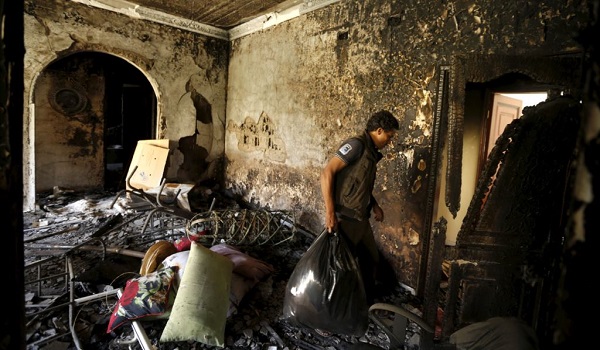Saudi-led Airstrikes Focus on Port City of Aden

Warplanes pounded Houthi rebel targets in Yemen on Thursday, two days after what was supposed to be the official end of the Saudi Arabia-led bombing campaign.
Witnesses said the raids hit areas around the main southern port city of Aden, where fighting continues between the Houthis and supporters of the country’s ousted government.
Saudi Arabia on Tuesday declared an end to the airstrikes, referred to as “Operation Decisive Storm.” Hours later, coalition planes targeted rebel positions in Aden and the central city of Taiz.
The month-long bombing campaign has killed hundreds and created a severe humanitarian crisis in Yemen, but has largely failed to drive back the Shi’ite rebels.
The Houthis have taken over large parts of Yemen and have forced the country’s Western-backed leader, President Abd-Rabbu Mansour Hadi, to flee to Saudi Arabia.
Supported by Iran
The rebels are believed to be supported by the Shi’ite government in Iran, which is reported to have sent a fleet of ships toward Yemen, ostensibly to assist the rebels.
Defense Secretary Ashton Carter said Wednesday the United States is “certainly concerned” the fleet of Iranian cargo ships are carrying weapons for Shi’ite Houthi rebels.
“There’s no reason for anybody to be delivering advanced weapons into a situation that’s already gotten way beyond what is reasonable,” Secretary Carter told reporters.
Washington has deployed the aircraft carrier USS Theodore Roosevelt, along with several other U.S. warships, to the waters off Yemen, partly in response to the reported Iranian convoy.
Carter would not say whether U.S. military officials are prepared to intercept and board the Iranian cargo vessels, but said that the presence of the U.S. ships gives the U.S. “options.”
President Barack Obama told the MSNBC television network on Tuesday the United States has sent “very direct messages” to Tehran that if there are weapons delivered to factions within Yemen, “that’s a problem.”
Saudi Arabia’s ambassador to the United States, Adel al-Jubeir, said Wednesday his country will carry out more airstrikes as necessary, but insisted the bombing campaign has achieved its primary objectives.
“We destroyed the air force; we destroyed their ballistic missiles as far as we know; we destroyed their command and control; we destroyed much, if not most, of their heavy equipment and we made it very difficult for them to move from a strategic perspective,” al-Jubeir said.
‘Degraded their capabilities’
“So we have degraded their capabilities substantially and thereby eliminated the threat that they posed to the Kingdom of Saudi Arabia and in the process ensured the safety of our borders, our territory and our citizens,” he added.
However, Al-Jubeir said there is “no military solution” to the conflict, and that the only way to achieve peace is through U.N.-sponsored peace talks. The Houthis also have expressed a desire to return to the talks.
Last week, U.N. Secretary-General Ban Ki-moon said the U.N.-supported diplomatic process “remains the best way out of a drawn-out war with terrifying implications for regional stability.”
The United States supported the bombings, but also welcomed the decision by the Saudi-led coalition to stop the campaign. The White House called for a quick resumption of talks by all Yemeni parties in an inclusive political transition process.
But White House spokesperson Jen Psaki said despite the declared halt to the airstrikes, there is instability in Yemen and the region. Psaki told CNN that “obviously, the job is not done.”
Iran welcomed what it called the end to “killing innocent and defenseless civilians” and called the move a “step forward” toward a political resolution.
According to the World Health Organization, 1,080 people have been killed and 4,352 wounded over the past month in Yemen.
VOA



















